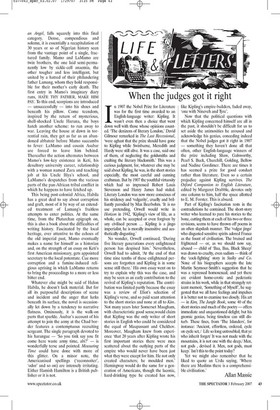When the judges got it right
1 n 1907 the Nobel Prize for Literature was for the first time awarded to an English-language writer: Kipling. It wasn't even then a choice that went down well with those whose opinions counted. 'The denizens of literary London,' David Gilmour remarked in The Last Recessional, 'were aghast that the prize should have gone to Kipling while Swinburne, Meredith and Hardy were still alive. It was a case, said one of them, of neglecting the goldsmiths and exalting the literary blacksmith.' This was a curious judgment, for, whatever else may be said about Kipling, he was, in the short stories especially, the most careful and cunning craftsman. But by 1907 the youthful virtuosity which had so impressed Robert Louis Stevenson and Henry James had staled. Literary London was now more conscious of his stridency and 'vulgarity', cruelly and brilliantly parodied by Max Beerbohm. 'It is no use pretending, Orwell would write in Horizon in 1942, 'Kipling's view of life, as a whole, can be accepted or even forgiven by any civilised person ... Kipling is a jingo imperialist, he is morally insensitive and aesthetically disgusting.'
No wonder, Orwell continued, 'During five literary generations every enlightened person has despised him' Nevertheless, Orwell had to admit, 'At the end of that time nine tenths of these enlightened persons are forgotten and Kipling is in some sense still there.' His own essay went on to try to explain why this was the case, and may be seen as an early contribution to the revival of Kipling's reputation. The contribution was limited partly because the essay was a review of Eliot's selection of Kipling's verse, and so paid scant attention to the short stories and none at all to Kim. Not many years later Somerset Maugham, with characteristic good sense,would claim that Kipling was the only writer of short stories in English who could be considered the equal of Maupassant and Chekhov. Moreover, Maugham knew from experience 'that 20 years after Kipling wrote his first important stories there were men scattered about the outlying parts of the empire who would never have been just what they were except for him He not only created characters; he moulded men.' Hemingway would do the same for a generation of Americans, though the laconic, hard-drinking type he created has now, like Kipling's empire-builders, faded away, 'one with Nineveh and Tyre'.
Now that the political questions with which Kipling concerned himself are all in the past, it shouldn't be difficult for us to set aside the animosities he aroused and acknowledge his genius, conceding indeed that the Nobel judges got it right in 1907 — something they haven't done all that often, other English-language winners of the prize including Shaw, Galsworthy, Pearl S. Buck, Churchill, Golding, Bellow and Nadine Gordimer. There are times it has seemed a prize for good conduct rather than literature. Even so a certain prejudice against Kipling survives. The Oxford Companion to English Literature, edited by Margaret Drabble, devotes only one column to him, half the space allotted to E. M. Forster. This is absurd.
Part of Kipling's fascination rests in the contradictions he contained. The short-story writer who learned to pare his stories to the bone, cutting them at each of his two or three revisions, seems to have thrown off poems in an often slapdash manner The 'vulgar jingo' who disgusted sensitive spirits adored France as the fount of civilisation. The bruised and frightened — or, as we should now say, abused — child of `Baa, Baa, Black Sheep' was drawn to cruelty, even sadism — think of the 'cock-fighting' story in Stalky and Co. None of his biographers accepts the late Martin Seymour-Smith's suggestion that he was a repressed homosexual; and yet there are evident homo-erotic and pederastic strains in his work, while in that strangely reticent memoir, 'Something of Myself', he suggested that we all have feelings and impulses it is better not to examine too closely. His art — in Kim, The Jungle Book, some 40 of the short stories and much of the poetry — offers immediate and unquestioned delight; but his gnomic genius, being timeless can still disturb. These lines, from 'The Islanders', for instance: 'Ancient, effortless, ordered, cycle on cycle set,! Life so long untroubled, that ye who inherit forget/ It was not made with the mountains, it is not one with the deep./ Men, not gods , devised it. Men, not gods, must keep.' Isn't this to the point today?
Yet we might also remember that he liked to quote an Urdu saying, 'Where there are Muslims there is a comprehensible civilisation.'
Allan Massie




















































 Previous page
Previous page